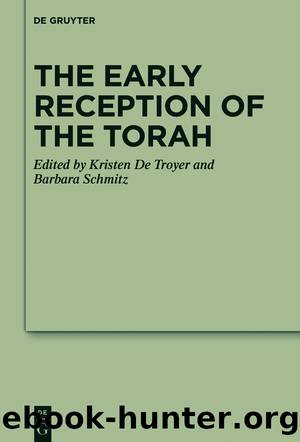The Early Reception of the Torah by Kristin De Troyer Barbara Schmitz Joshua Alfaro Maximilian Häberlein

Author:Kristin De Troyer, Barbara Schmitz, Joshua Alfaro, Maximilian Häberlein
Language: eng
Format: epub
Publisher: De Gruyter
Published: 2020-07-20T12:47:14.087000+00:00
Introduction
It has been argued that âThe Wisdom of Jesus Ben Sira,â1 dated to the beginning of 2nd century BCE, is a significant Hellenistic wisdom text that demonstrates the convergence between Israelite Wisdom tradition and the Torah. It is possible to understand Ben Sira supporting a pan-Aaronic priesthood and the temple of Jerusalem and indirectly criticising Zadokite priesthood, but the main issue of Ben Sira is not temple cult and ceremony, but the observance of laws and ethical behaviour.2 Ben Sira, in particular, has been regarded as having a closer association with the phraseology and heritage of the Deuteronomic Torah than the priestly Torah. Thus our major concern of Torah is that of Deuteronomists or the Deuteronomic theology. Subsequently, the question is: How can we recognise the relationship between Wisdom and Deuteronomic Torah in Ben Sira? On the one hand, some maintain that the ideology of the Deuteronomistic History and Mosaic Torah has swallowed wisdom in Ben Sira.3 On the other hand, it has been accepted that the Torah is sapientialised and subjugated into Hellenistic wisdom.4 Greg Goering takes a middle position between the two viewpoints and argues that wisdom as universal is internationalised for all humanity apart from the Israelite History, while wisdom is particularised for the chosen nation in the Torah.5 The trend has continued in recent researches, e.âg., Benjamin Wright argues that Ben Sira internalised the Torah for the use of pedagogy,6 and Pancratius Beentjes is of the opinion that the reference to the book of Deuteronomy should be minimalised and parallels ought to be attributed to the common source.7
Whether Torah is subsumed into Wisdom, Wisdom is subjugated into the Torah, or both of these processes occuring at the same time, the common argument is that Ben Sira was aware of part of the Torah (written or oral) and that he utilised it in his writing. The scholarly common view of the literary dependence of Ben Sira on the Deuteronomic Torah is barely challenged, though it is occasionally opposed by some scholars.8 The question remains: Did Ben Sira in his writing know and utilise the Mosaic Torah and its fundamental elements like a Jewish proto-canon? To examine the use of Torah in Ben Sira, I will first examine constraints of the claim, that Ben Sira admits Deuteronomic heritage, whether favourably or competitively. I will then expound how Ben Sira develops contemporary Jewish ideas such as retribution, election, piety, free will, and mercy, distinguishing them from Deuteronomic thought.
Download
This site does not store any files on its server. We only index and link to content provided by other sites. Please contact the content providers to delete copyright contents if any and email us, we'll remove relevant links or contents immediately.
The Power of Myth by Joseph Campbell & Bill Moyers(1046)
Half Moon Bay by Jonathan Kellerman & Jesse Kellerman(976)
Inseparable by Emma Donoghue(969)
A Social History of the Media by Peter Burke & Peter Burke(966)
The Nets of Modernism: Henry James, Virginia Woolf, James Joyce, and Sigmund Freud by Maud Ellmann(888)
The Spike by Mark Humphries;(800)
The Complete Correspondence 1928-1940 by Theodor W. Adorno & Walter Benjamin(770)
Culture by Terry Eagleton(768)
A Theory of Narrative Drawing by Simon Grennan(767)
Ideology by Eagleton Terry;(728)
World Philology by(709)
Farnsworth's Classical English Rhetoric by Ward Farnsworth(703)
Bodies from the Library 3 by Tony Medawar(700)
Game of Thrones and Philosophy by William Irwin(697)
High Albania by M. Edith Durham(693)
Adam Smith by Jonathan Conlin(683)
A Reader’s Companion to J. D. Salinger’s The Catcher in the Rye by Peter Beidler(670)
Comic Genius: Portraits of Funny People by(642)
Monkey King by Wu Cheng'en(640)
